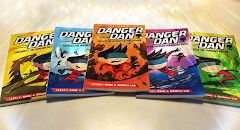In primary school, Lesley-Anne was in the library CCA, which she never fails to blame me for. The story behind it was that she was in p4 and had just gotten into GEP. I was worried about the upcoming workload and so urged her to take up a light CCA. Since she wasn't into sports, library seemed ideal - just a couple of hours of duty a week and you perform them in air-conditioned comfort. Quite shiok right? Except she found it supremely boring. I guess wrapping and shelving books isn't exactly heady stuff.
So when it came to secondary school, I'd learnt the error of my ways (basically never make certain decisions for your kid or you'll never hear the end of it). "Go choose whatever CCA you want!" But old habits die hard and mummy always thinks she knows better. So while I didn't force her to choose any path, I couldn't resist planting some ideas.
You see, I always wished that I'd joined a concert band when I was in school. There's something very appealing about playing music as a group - it's a much more dynamic experience then playing solo. So I made the suggestion to Lesley-Anne, even nudging her to speak to my sister who played percussion in her JC band (which if my memory serves me well, was also instigated by me. Once a kaypoh, always a kaypoh.)
Quite to my delight, Lesley-Anne was rather taken by the idea and decided to opt for the concert band as a CCA. Such is the power of suggestion. Or maybe projection. She auditioned and was accepted, thanks to her music background. Initially, she'd wanted the flute but there was only one vacancy and it was quickly filled so she ended up with the clarinet which was her second choice.
Since the sec 1s are newbies, they take almost a year to learn their allotted instruments under the junior band. They stay back after school twice a week, 3 hours each time to have sectional practices as well as practices together as a band. Each section has its own music teacher and there is a main teacher who leads the entire junior band. When they have progressed sufficiently, they will join the main band towards the end of the year, to take over the outgoing sec 4s.
It's been about two months since Lesley-Anne started the CCA and she's enjoying every minute of it. She has already begun to play simple songs although I haven't heard her play as the students are discouraged from bringing their instruments home for now. When she talks about the band, her eyes light up - it's clearly one of the highlights of school for her.
I can see that the appeal is more than simply playing music. Being part of the band means bonding with a small group of like-minded students. The clarinet section (which happens to be the largest section) holds regular bonding sessions and activities, it's like a mini club and the kids form strong friendships. Eventually when the band enters competitions or plays in concerts, I can imagine the shared experience will only serve to strengthen ties.
Before I wrote this post, I asked Lesley-Anne, "So was joining the band everything that you expected it to be?" She didn't hesitate. "No. It's even better than I expected." Well, one thing's for certain - it sure beats library. Phew.




















